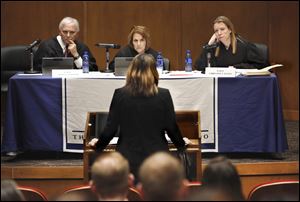
Teen convicted in death appeals
Murder, arson case was moved out of juvenile court
3/23/2017An attorney for a teen-aged girl convicted of setting a fire that killed one and injured two others argued Wednesday that her case’s transfer from Lucas County Juvenile Court to adult court was unconstitutional.

Judges Thomas Osowik, Arlene Singer, and Christine Mayle, from left, listen while Charlyn Bohland, an assistant state public defender, speaks about Kassi Brandeberry’s sentence.
Kassi Brandeberry, who was 17 at the time of the offenses, was sentenced in May to life in prison with parole eligibility after 21 years. She pleaded guilty in Lucas County Common Pleas Court to murder, two counts of aggravated arson, and attempted burglary for setting a May 2, 2015, fire that killed Joseph Fazenbaker, 14, and injured his stepbrother and a Toledo firefighter.
Ohio’s 6th District Court of Appeals, which heard arguments at the University of Toledo college of law, now must decide the constitutionality of her mandatory transfer to the adult court as well as the mandatory minimum sentence — 15 years to life — Brandeberry received for murder.
Charlyn Bohland, an assistant state public defender who filed Brandeberry’s appeal, said courts have recognized that juveniles prosecuted in adult courts must be treated differently. Three pivotal cases are pending before the Ohio Supreme Court, she said.
“The sentencing of children has changed dramatically in the last 12 years because the Supreme Court has recognized that children are not miniature adults,” Ms. Bohland told the three-judge panel: Arlene Singer, Thomas Osowik, and Christine Mayle.
She pointed to a Jan. 27 decision by the 6th District Court that reversed another Toledo teen’s conviction. The court concluded that Shonta Jones, Jr., who was 17 when he allegedly shot Carter Coley, Jr., 17, to death, should have had a hearing in juvenile court to determine whether he was amenable to rehabilitation in the juvenile justice system before his case was sent to adult court.
The Jones decision relied heavily on a December ruling by the Ohio Supreme Court finding that because 16 and 17-year-olds are children, “their age should not be treated as the sole decisive factor in determining whether they are transferred for criminal prosecution,” and all should have amenability hearings in juvenile court.
Ms. Bohland also argued Brandeberry should not have received a mandatory minimum sentence, writing in a brief that “Ohio’s mandatory minimum sentencing scheme provides no opportunity for the sentencing court to consider the child’s age and the mitigating factors of youth; the child’s family and home environment ... the possibility of rehabilitation and the child’s capacity for change.”
Evy Jarrett, an assistant Lucas County prosecutor, told the appellate panel Brandeberry received an “extremely carefully crafted” sentence that recognized that 15 years to life for murder was not enough time to rehabilitate her.
“What we have here is an extremely serious crime,” Ms. Jarrett said. “We have one individual who lost a life. We have severe injuries suffered by another occupant of the home. We have a firefighter who was injured, severe property damage as well.”
In Brandeberry, she said, “We have an individual who had not been successfully rehabilitated through the juvenile justice system in the past .... Finally, we have her age. She was 17 at the time of the crimes. I believe she must be 19 to 20 at this point so that it would appear almost a foregone conclusion that she will not be amendable to rehabilitation in the one to two years remaining in the juvenile court system.”
The appeals court took the matter under advisement and will issue a written decision.
Contact Jennifer Feehan at: jfeehan@theblade.com or 419-213-2134.